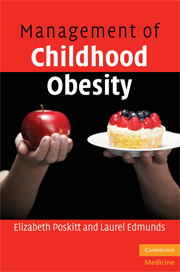Book contents
- Frontmatter
- Contents
- Foreword by David W. Haslam
- Preface
- Acknowledgements
- List of abbreviations
- 1 Introduction
- 2 How fat is fat? Measuring and defining overweight and obesity
- 3 Where should overweight/obese children be managed?
- 4 How do we approach the overweight/obese child and family?
- 5 The clinical assessment: what are the special points?
- 6 What complications should we look for now and later?
- 7 How does psychology influence management?
- 8 Management: what do we mean by lifestyle changes?
- 9 How can we reduce energy intake?
- 10 How can we increase energy expenditure?
- 11 What else can be done?
- 12 How can we sustain healthy weight management?
- 13 What can we do to prevent childhood overweight and obesity?
- References
- Index
5 - The clinical assessment: what are the special points?
Published online by Cambridge University Press: 08 August 2009
- Frontmatter
- Contents
- Foreword by David W. Haslam
- Preface
- Acknowledgements
- List of abbreviations
- 1 Introduction
- 2 How fat is fat? Measuring and defining overweight and obesity
- 3 Where should overweight/obese children be managed?
- 4 How do we approach the overweight/obese child and family?
- 5 The clinical assessment: what are the special points?
- 6 What complications should we look for now and later?
- 7 How does psychology influence management?
- 8 Management: what do we mean by lifestyle changes?
- 9 How can we reduce energy intake?
- 10 How can we increase energy expenditure?
- 11 What else can be done?
- 12 How can we sustain healthy weight management?
- 13 What can we do to prevent childhood overweight and obesity?
- References
- Index
Summary
Most children presenting to the community with overweight or obesity have no recognizable medical condition contributing to their problem. Very rarely obesity presents as part of a specific syndrome or its development has been facilitated by an underlying medical problem. Parents sometimes attribute their child's obesity to ‘the glands’, a conviction which may seem to offer hope of a quick solution rather than the prospect of lifestyle changes and long-term weight monitoring. To reassure these parents and to exclude obesity syndromes all children presenting with overweight/obesity should have thorough paediatric clinical assessment.
Clinical assessment is also important to evaluate the effects of the obesity on health. Many conditions previously thought complications for long-term adult obesity only are now diagnosed in adolescents and even in much younger obese children. The first line of management for such conditions is usually reducing the excessive fatness but being made aware of developing co-morbidities may help commit some families to action over weight control. Even without the severe co-morbidities, overweight children can have orthopaedic, skin and respiratory problems exacerbated by obesity. We discuss co-morbidities briefly in Chapter 6 but any initial clinical examination must bear these potential problems in mind since they may require referral to specialist services.
Looking for underlying pathology
It is unusual for children with specific syndromes contributing to their obesity to present with obesity as the main clinical problem. The exceptions to this are children with the genetically determined leptin disorders.
- Type
- Chapter
- Information
- Management of Childhood Obesity , pp. 58 - 71Publisher: Cambridge University PressPrint publication year: 2008



